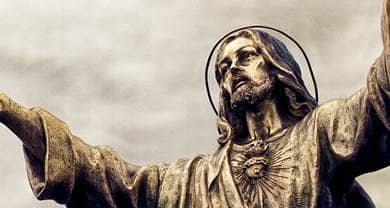- Trending:
- Forgiveness
- |
- Resurrection
- |
- Joy
- |
- Feminism
- |
- Afterlife

RELIGION LIBRARY
Lutheran
Founders
Lutheranism was founded by Martin Luther (1483-1546) as a reform movement within the Roman Catholic Church. Luther was the son of Hans and Margarthe (born Lindemann) Luther. Hans Luther was a miner who eventually leased and owned several mines, thus belonging to the growing middle class of the time. His mother was a woman of modest means from a trading family. Like many upwardly mobile couples, the Luthers educated their son well and sent him to the University of Erfurt in 1501 to train to be a lawyer. According to a widely accepted legend, while returning to school after a visit to his parents, Luther was caught in a thunderstorm, and when lightning hit nearby he cried out in fear "Help, Saint Anne, I will become a monk!" (Saint Anne is the patron saint of miners, and was thus a prominent figure in the mining region where Luther was raised.) Rather than returning to law school he entered the Augustinian monastery in Erfurt in 1505. Only after he was safely behind the walls did he inform his father, who was furious that Luther had thrown away his education and his prospects of being a lawyer in exchange for a life of avowed poverty.
Luther reports that he was a very conscientious monk: "I kept the rule of my order so strictly that I may say that if ever a monk got to heaven by his monkery it was I." The head of his order selected him for further education and a teaching career. This was in line with the dominant teaching that, following baptism, a Christian needed to perform works to appease a God angered by sin and earn entry into heaven.
Many years later Luther mentions what he calls his "Tower Experience" (scholars date this between 1513 and 1518). Luther was preparing a lecture on Paul's Letter to the Romans for his university students at the nearby University of Wittenberg. He was in the bathroom (this is a common medieval literary device to emphasize that an insight that comes to us in our basest state should be attributed not to us but to God) when he realized that the Greek original of Romans 1:17 could be mean "the righteous shall live by faith" (as he had been taught) or "the righteous by faith shall live." They sound similar, but the first means that you should work to be righteous, and your reward will be faith. The second means that God gives faith, and it is faith (that Luther defines as confidence that God has forgiven your sins) that saves you. This is the key theological insight of the Reformation and the first Reformation motto: justification (forgiveness) by faith alone.
In 1517 the Indulgence Controversy broke out. Many Catholics criticized the selling of indulgences. But Luther's criticism was based on his new (or, he claims, old) theology that no works, including indulgences, can earn merit and get you into heaven; rather, only the gift of faith can. When John Eck, the pope's legate, argued against this theology, claiming that only the pope has the authority to determine correct belief and correct interpretation of scripture, Luther argued that scripture itself is the final authority. Luther found no scriptural support for a variety of Roman practices, including indulgences. The second Reformation motto, therefore, is sola scriptura (scripture alone).
Luther was excommunicated by Pope Leo X in 1521. He returned the favor by burning the papal bull of excommunication in front of a cheering crowd of his students. That same year the Emperor summoned him to a meeting in the city of Worms to determine if Luther should also be condemned as a criminal. Luther's Prince, Frederick the Wise of Saxony, obtained from the Emperor a guarantee of safe passage for Luther to and from Worms. At this meeting Luther was not offered a chance to defend his theology. Instead, he was presented with a stack of his books, asked if they were his, and told to recant. After thinking it over for a night he returned the next day, famously stating (according to some accounts): "My conscience is captive to the Word of God. I cannot and will not retract anything, since it is neither safe nor right to go against conscience. May God help me! Amen!" On his way out of Worms, Luther was "kidnapped." His own Prince, Frederick, not trusting the Emperor's promise of safe passage, staged the kidnapping and hid Luther in one of his castles, on the Wartburg mountain. Frederick, thus, must also be considered a founder of Lutheranism for his ongoing protection of Luther.
Luther hid at Wartburg for ten months, grew a beard, and translated the New Testament from the Greek into German so that everyone could read it for himself or herself. On Christmas 1521 a fellow priest and professor, Carlstadt, celebrated Christmas mass in a very non-traditional way. Luther's ideas were being carried out too quickly and, in some cases, being exaggerated or misapplied, causing too much anxiety for the town and parishioners alike. He left the safety of Wartburg and returned to Wittenberg to take charge of the movement.
Because works could not save, and each stands before God alone without the mediation of a priest, Luther and other early Protestants closed down monasteries and convents wherever they were in control. (One reason many princes supported the Reformation was because it gave them the authority to "secularize" church property, that is, seize it and use the proceeds for their own coffers.) Thus the third Reformation motto is the priesthood of all believers. These three mottos and the theological reasons for them can be found in Luther's three passionate essays from 1520, "Freedom of a Christian," "To The Princes of the German Nation," and "The Babylonian Captivity of the Church."
In 1525 Luther married Katherine von Bora, who had been a nun at a Cistercian convent. He had found husbands for all of the nuns, but not for Katherine who was considered old at 26. They had six children, four of whom survived into adulthood. Katherine must also be considered a founder of Lutheranism. Luther had many visitors, and no priestly income. Katherine's skill as a business woman, taking in boarders, brewing beer, and breeding pigs, provided for the family and Luther's activities.
Finally, Philipp Melanchthon (1497-1560) is an important founder. He was, moreso than Luther, the scholar-theologian of the Lutheran Reformation. His early commitment to humanism can be seen in his changing of his name from Philipp Schwartzerd (German for black earth) to its Greek equivalent Melanchthon. He served as Luther's spokesperson, since as a condemned criminal Luther often could not appear at conferences and debates. He was a close associate, and after Luther's death assumed leadership of the Lutheran movement. He wrote two of the key texts in the Book of Concord (1580): the Augsburg Confession (1530) and its Apology (1531).










